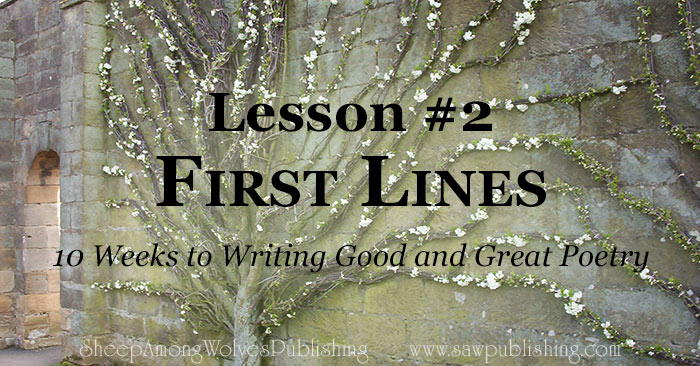Why First Lines Can Make or Break a Poem
Sheep Among Wolves’ Good and Great Poetry Course was created to teach high school students how to write poems that are both good and great. This FREE 10-week course takes a look at some fundamental elements of poetical structure as well as the themes and subject-matter which really make up the soul of a poem. For a full explanation of the course, see our post entitled 10 Weeks to Writing Good and Great Poetry. To receive the course in 10 weekly email lessons, sign up here, or at the bottom of this post.

You can never make a second first impression. That may sound rather cliché, but every cliché has a foundation in fact. It’s very hard to undo a bad first impression, and a good first impression sticks with your audience for a long time to come. A poem that we like from the first time we read it, has a positive power and association which are directly connected to our first impression. That’s why first lines are some of the most important lines in the entire poem, and often dictate whether the poem is actually read at all.
Catching the Reader’s Attention . . . Or Not
There is a lot of poetry in the world. Most of us don’t have time to read every poem in every book that we ever pick up. And most of us wouldn’t necessarily want to read every poem in every book that we ever pick up. So we look at the title, the first line, and the first stanza, and if our attention is not caught, we turn the page and begin on the next one. Perhaps it isn’t always fair to every poem that we skip, but the reality is that we have to make a judgement call at some point, and the opening lines are often that point.
Titles and First Lines
Have you ever flipped through a hymnal looking for a title that caught your attention? Perhaps before church on a Sunday morning, especially if you’re visiting a congregation who has a hymnal you’ve never seen before. You probably don’t look at the hymn unless the title catches your interest. And if you’ve ever noticed, most hymn titles are actually only the first line—whatever that first line might say. There are some really good hymns which I have often overlooked, because the title was so unappealing. “Not All the Blood of Beasts” is a good example of this. The thought of the poem is sound and good, speaking of how Christ’s atonement accomplished what the sacrifices of the law were insufficient for. But the first line—and consequently the title—don’t invite us to read it.
First Lines Require Thought
So how can we write a first line which will have the right effect on our readers? Possibly the most important thing we can do, is first of all to think about it. If you recognize the impact your first line will have on anyone reading your poetry, you will be more careful about what it says. This spring I made my first attempt at writing a hymn, and I thought about the importance of the first line as I was writing it. I didn’t want to ruin whatever I had to say, by giving it a title which didn’t engage the reader. So I left the first line alone, and wrote almost the entire hymn before I decided on how to start it. My subject was Easter, and I finally called the hymn “Ye Sons of Zion, Raise the Jubilee,” hoping that the thought I’d put into it would attract readers who wanted a triumphant Easter hymn.
First Lines Need to Reflect the Tone of the Piece
The first lines of your poem are like an advertizing campaign—they should clearly reflect what you are “selling”, and attract your target “customer.” This can be done most effectively by making sure that your first lines are in the same tone as your entire poem. If your poem is one of triumph and rejoicing, the first lines should echo with jubilation and victory. If it’s pensive or sad, the first lines should have a subdued or regretful tone. If you are writing about nature, you should make your first lines appeal to the nature-lover. Whatever your poem is about, it is of paramount importance that your first lines clearly tell the reader what tone you intend to convey.
First Lines Should Be Powerful and Intriguing
You want the reader to be so struck by your opening lines that they have to read the rest of the poem. There are so many other poems out there, that they will likely need a line that is powerful and original to get them interested in what you have to say. Probably, they will give you an entire stanza or two to catch their attention, but it’s best to interest them at the first line. If you have some original or striking thought, don’t wait until the third stanza to get around to saying it, if you can reasonably say it at once. This won’t work in all circumstances, and by no means should it take away from the strength of your ending, but it does help if your opening words are powerful. You want the reader’s curiosity to be piqued by those lines, so that they want to know what follows.
Starting Well
We all know that first lines are not the entirety of a poem, nor should they be. But they do impact the first impression on our readers, and often determine whether they read to the end, where our conclusions are drawn. Beginning with a good first line can make a good poem great, and it certainly gives you time to reach your strong conclusion, whatever it may be. Be encouraged to start you poems well—to put thought and effort into reflecting the tone, and creating a powerful beginning, because you never know where it may lead you.
To receive a PDF of the assignment for this lesson sign up below.
How To Sign Up
All ten poetry lessons can be found by clicking on the Poet’s Corner tab in the menu. If you would like to receive the course assignments as well, you can sign up below to have the lessons and assignments delivered by email over a ten week period.

